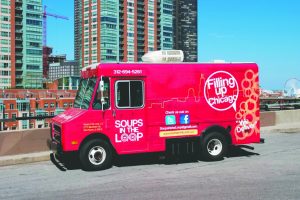Food trucks come up empty in Supreme Court fight
By Kevin Beese Staff Reporter — May 28, 2019
: The Illinois Supreme Court has ruled that municipalities have the right to put appropriate restrictions on the operation of food trucks. In a Chicago case, justices said May 23 that Chicago has created a “regulatory scheme that attempts to balance the interests of food trucks with the need to promote neighborhood stability that is furthered by brick-and-mortar restaurants.” (Roaming Hunger photo)
The Illinois Supreme Court has ruled that municipalities have a right to restrict the operations of food trucks and require tracking devices on the vehicles.
Justices on May 23 unanimously upheld lower court rulings backing restrictions Chicago has put in place for the mobile food providers.
Supreme Court Justice Anne Burke wrote that municipalities have a right to protect restaurants’ interests and that nothing in Chicago’s “200-foot” rule — where food trucks cannot operate within 200 feet from the entrance of a restaurant — is unconstitutional.
“Both brick-and-mortar restaurants and food trucks are important businesses that bring significant benefits to the city. However, they do so in very different ways,” Burke said. “Brick-and-mortar restaurants bring stability to the neighborhoods in which they are located. The restaurants pay property taxes and have a vested interest in seeing that their neighborhoods continue to grow and thrive so that their own business will flourish.
“Moreover, in certain areas of the city, such as Greektown, restaurants are a vibrant part of the community and bring a long-term sense of cohesiveness and identity to the area. In this way, brick-and-mortar restaurants can help establish certain parts of the city as tourist destinations in and of themselves, thereby increasing revenue for the city and improving stable economic growth.”
LMP Services, Inc., owned by Laura Pekarik and operator of “Cupcakes for Courage’ food trucks, had argued that the 200-foot rule violated the equal protection and due process clauses of the Illinois Constitution, labeling them protectionist and unreasonably favoring brick-and-mortar restaurants over food trucks.
“The city has a legitimate governmental interest in encouraging the long-term stability and economic growth of its neighborhoods,” Burke said. “The 200-foot rule, which helps promote brick-and-mortar restaurants, and, thus, neighborhood stability, is rationally related to this legitimate interest.”
The justices noted that there are designated areas in the city that allow food trucks to be within 200 feet of a restaurant.
“Thus, the city has not entirely banned food trucks,” Burke said. “Rather, it has created a regulatory scheme that attempts to balance the interests of food trucks with the need to promote neighborhood stability that is furthered by brick-and-mortar restaurants.”
The justices noted that food trucks bring a life and energy to the city all their own, but they simply do not have the same long-term stabilizing effect as restaurants.
“The business model of food trucks and a good deal of their appeal are built on mobility, not stability,” Burke said. “The trucks may be in the city one day and in Evanston or Aurora the next.”
LMP Services had also argued that a new Chicago requirement that food trucks within its limits all be equipped with global positioning system equipment and transmit their location to a service provider equaled a “warrantless” search in violation of the state Constitution. LMP Services said that truck locations are published on social media and most trucks have phones, making the GPS requirement unnecessary.
Chicago officials said they instituted the GPS requirement, which they have never used, in order to be able to reach food truck owners in the event of a public health emergency or a complaint of unsafe or unsanitary conditions.
Supreme Court justices sided with Chicago leaders who argued that other means, such as social media, are unreliable for locating trucks.
“Information on social media is often outdated or inaccurate, and food trucks, when busy, often fail to answer phone calls,” Burke said. “Thus, the GPS system is the best and most accurate means of reliably locating a food truck, which is particularly important and necessary in the event of a serious health issue.”
LMP Services had also argued that the GPS tracking was an invasion of privacy as the public would know the location of the trucks through the tracking device.
Justices noted that food trucks, by their very nature, are mobile eateries that have to broadcast their location to attract customers so any expectation of privacy “is greatly diminished, if it exists at all.”
The Supreme Court judges also noted that the Chicago requirements only call for the food trucks to transmit their location to the city’s service provider, not broadcast it to the public.
Laura Pekarik of LMP Services was unavailable for comment as of press time.
kbeese@chronicleillinois.com








